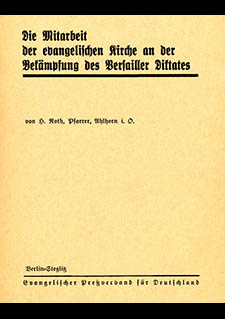Protestants and the Republic
According to the 1925 census, 64.1 percent of the German Reich’s population were Protestant, i.e. slightly less than 40 million. For the most part, active church members came from the “old middle class” as well as from rural and aristocratic families.
This core of the Protestant social environment took a skeptical to negative view of the democratic, ideologically neutral Weimar Republic. The shock resulting from the loss of the war and the revolution of 1918 had a long-lasting effect. German Protestants retained their deep emotional bond with the Wilhelmine, monarchic national state after its collapse. The majority of Protestants retained nationalistic and, for the most part, even monarchist views in the Weimar Republic, too.
The Protestant majority concentrated its political attention on the “stab-in-the-back myth” that sprang up at war’s end as well as on the campaign against the “war guilt lie” and the “Diktat of Versailles”. They primarily feared the threats of Communism, the Jews and so-called “cultural Bolshevism”. Protestants thus had a share in the radicalization of German nationalism after World War I.
Protestants largely retained their reservations about democracy during the Weimar Republic. The loss of the alliance of throne and altar and consequently also the threat to their position as the dominant culture in the German Reich tended to intensify a reactionary, detached attitude toward the republic and the democratically constituted nation among Protestants despite some temporary “official pragmatic republicanism on the part of the church”.
Many Protestants found their political home in the German National People's Party (DNVP). Formed in 1918 from the fragmented parties of the right-wing camp, its activities had an antidemocratic, monarchist and anti-Semitic thrust.
Constructive debate on the principles of democracy such as the separation of powers, human rights, the parliamentary system and the principle of majority rule played a marginal role in the social ethics of the day. Human beings as individuals that acted autonomously guided by reason played only a subordinate or negative role in many theologians’ thinking, which was critical of or hostile toward the Enlightenment and imbued by such notions as crisis, community, authority and order. A “true theology of democracy” (Nowak) was nowhere to be found among the numerous new theological concepts after 1919.
Source / title
- © Ev. Arbeitsgemeinschaft für Kirchl. Zeitgeschichte München, KK B 395:68

